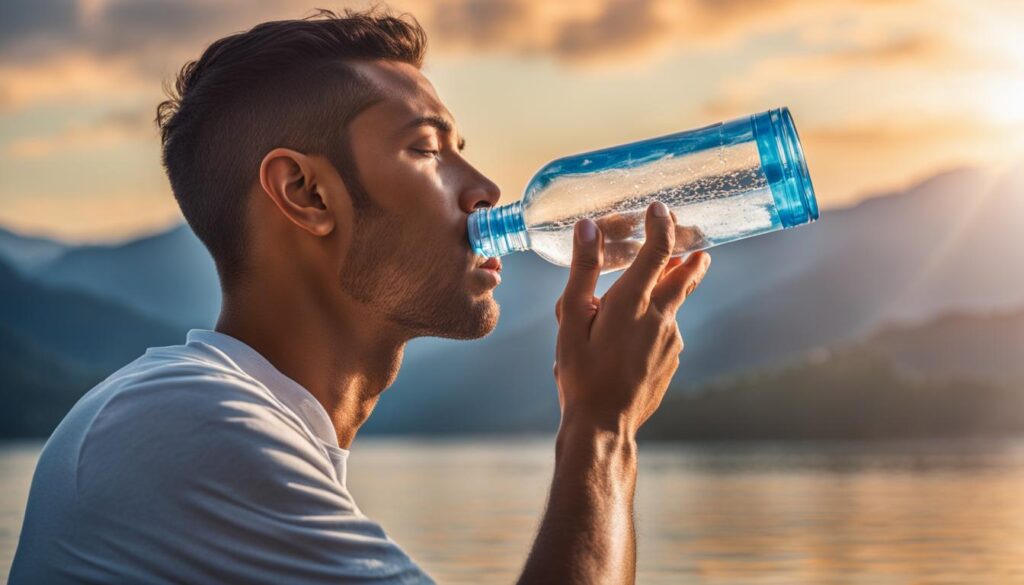When it comes to prayer and fasting, many individuals wonder if they can drink water while abstaining from food. As one of the most important spiritual disciplines, fasting holds a significant place in Christian traditions, offering spiritual renewal and a closer connection with God. But what about the role of water in fasting? Let’s explore this question and understand the benefits of hydration during fasting.
Before we delve into the details, it’s essential to clarify that drinking water during an intermittent fast is generally allowed. Unlike food, water does not affect blood sugar or insulin levels, making it safe to consume while fasting. In fact, staying hydrated during a fast is highly recommended to support overall well-being and ensure that your body functions optimally.
However, it’s important to note that there is also a form of fasting known as dry fasting, which restricts all foods and liquids, including water. Dry fasting can have potential health complications and should be approached with caution. Therefore, for the purpose of this article, we are mainly focusing on intermittent fasting, where water is permitted.
Key Takeaways:
- Drinking water during intermittent fasting is generally allowed and safe.
- Water does not break the fast or affect blood sugar or insulin levels.
- Staying hydrated during fasting is important for overall well-being and bodily functions.
- Dry fasting restricts all foods and liquids, including water, and can have health complications.
- Intermittent fasting allows for the consumption of other calorie-free beverages such as tea, coffee, and flavored water.
The Connection Between Prayer and Fasting for Spiritual Growth
Fasting and prayer are two interconnected spiritual practices that can greatly contribute to spiritual growth and strength. By combining these disciplines, individuals can experience a deeper connection with God and cultivate a greater sense of inner peace and clarity.
When we engage in fasting, we are intentionally abstaining from food and sometimes even water for a specific period. This act of self-denial helps us to focus our attention and energy on seeking God and His will for our lives. Through fasting, we are able to remove physical distractions and create space for spiritual renewal.
In addition to its purifying effects on the body and soul, fasting can also be a form of meditation. By quieting our minds and bodies, we can enter into a state of deep reflection and communion with God. This practice allows us to open ourselves up to divine guidance and spiritual revelation.
| Benefits of Combining Prayer and Fasting for Spiritual Growth | Scriptural Basis |
|---|---|
| Increased focus and clarity | Matthew 17:21 – “However, this kind does not go out except by prayer and fasting.” |
| Deeper connection with God | Joel 2:12 – “Yet even now,” declares the Lord, “return to me with all your heart, with fasting, with weeping, and with mourning.” |
| Spiritual renewal and cleansing | Isaiah 58:6 – “Is not this the fast that I choose: to loose the bonds of wickedness, to undo the straps of the yoke, to let the oppressed go free, and to break every yoke?” |
“Fasting is like hitting the reset button for our souls. It allows us to let go of the distractions and burdens of this world and focus solely on our relationship with God.” – Unknown
Spiritual Practices and Fasting
Fasting is a spiritual practice that has been observed in various religions and cultures throughout history. It is a way to purify the body, focus the mind, and draw closer to the divine. In Christianity, fasting is often practiced in conjunction with prayer as a means of seeking spiritual growth and strength.
The act of fasting is not meant to be seen as a mere ritual or obligation, but rather as an opportunity for personal transformation and connection with God. It is a time to reflect on one’s own spiritual journey, seek forgiveness, and deepen one’s faith.
By combining prayer and fasting, individuals can create a sacred space for spiritual introspection and growth. This powerful duo has the potential to ignite a fire within the soul and bring about profound spiritual breakthroughs.
Health Benefits of Fasting and Hydration
Fasting has been found to offer numerous health benefits, making it an appealing practice for many individuals. When combined with proper hydration, fasting can further enhance these benefits and promote overall well-being. Let’s explore some of the key health benefits associated with fasting and the importance of staying hydrated during this practice.
The Benefits of Fasting:
Fasting has been shown to aid in weight loss, as it allows the body to tap into stored fat for energy. This can lead to a reduction in body weight and improved body composition. Additionally, fasting has been found to improve insulin sensitivity, which can have positive effects on blood sugar control and metabolic health.
Furthermore, fasting has been linked to a reduction in inflammation in the body, which is believed to play a role in the development of chronic diseases such as heart disease and diabetes. By reducing inflammation, fasting may contribute to improved overall health and a lower risk of certain medical conditions.
The Importance of Hydration:
During fasting, it is essential to maintain proper hydration. Drinking water throughout the fasting period helps to support the body’s processes and prevent dehydration. Adequate hydration is crucial for many bodily functions, including digestion, temperature regulation, and detoxification.
Proper hydration also supports the overall well-being of individuals practicing fasting. It can help prevent headaches, fatigue, and other symptoms associated with dehydration. By staying properly hydrated, individuals can ensure their bodies are functioning optimally during the fasting period.
| Health Benefits of Fasting | Importance of Hydration |
|---|---|
| Weight loss | Supports digestion |
| Improved insulin sensitivity | Regulates body temperature |
| Reduced inflammation | Aids in detoxification |
| Prevents dehydration |

In Summary:
Fasting offers several health benefits, including weight loss, improved insulin sensitivity, and reduced inflammation. To maximize these benefits, it is crucial to stay properly hydrated during fasting. Drinking water supports the body’s processes, aids in digestion and detoxification, and helps prevent dehydration. By combining fasting with hydration, individuals can experience enhanced overall well-being and improved health outcomes.
The Role of Water in Intermittent Fasting
Intermittent fasting has gained popularity for its potential health benefits and ability to support weight management. But what role does water play in this fasting practice? Let’s explore the importance of water during intermittent fasting and how it can enhance the fasting experience.
During intermittent fasting, individuals alternate between periods of eating and fasting. While fasting, it is generally allowed to consume water without breaking the fast. Water is a calorie-free beverage that does not impact blood sugar or insulin levels, making it an ideal choice to stay hydrated during the fasting period.
Hydration is key during intermittent fasting. Drinking water not only quenches thirst but also supports the body’s essential functions. It aids in digestion, circulation, and the transportation of nutrients throughout the body. Staying hydrated can also help prevent headaches, fatigue, and other common symptoms that may arise during fasting.
The Benefits of Drinking Water During Intermittent Fasting
Drinking water during intermittent fasting offers several benefits:
- Helps maintain hydration levels and supports bodily functions
- Prevents dehydration, which can cause dizziness, fatigue, and other discomforts
- Curbs hunger and cravings, making it easier to stick to the fasting schedule
- Aids in detoxification by flushing out toxins from the body
“Drinking water during intermittent fasting not only keeps you hydrated, but it also enhances the fasting experience by curbing hunger and supporting vital bodily functions.” – Dr. Jane Williams, Fasting Expert
While water is the go-to choice for hydration during intermittent fasting, other zero-calorie beverages like tea, coffee, apple cider vinegar, and flavored water can also be consumed. However, it is essential to avoid drinks that contain calories or sugar, as they can break the fast and hinder the desired outcomes of fasting.
| Benefits of Drinking Water During Intermittent Fasting | Benefits of Avoiding Calorie and Sugar-containing Drinks |
|---|---|
|
|
By prioritizing hydration and choosing calorie-free beverages, individuals practicing intermittent fasting can optimize their fasting experience and reap the many benefits this fasting pattern offers.
Conclusion
Prayer and fasting are powerful spiritual disciplines that can lead to profound transformation and renewal. These practices, when combined with proper hydration, offer a range of health benefits as well.
During fasting, it is generally permitted to drink water and other calorie-free beverages such as tea, coffee, and flavored water. These drinks not only help maintain hydration but also support the fasting process and overall well-being.
By engaging in prayer and fasting, individuals can experience spiritual growth, increased focus, and a deeper connection with God. Additionally, fasting has been found to promote weight loss, improved insulin sensitivity, and reduced inflammation.
In conclusion, prayer and fasting are not only spiritually significant practices but also have the potential to positively impact physical health. By prioritizing proper hydration and making mindful beverage choices, individuals can maximize the benefits of fasting and enhance their overall well-being.
FAQ
Can I drink water while fasting?
Yes, drinking water is generally allowed during fasting. Water does not affect blood sugar or insulin levels, making it safe to consume while fasting. It is recommended to drink water to stay hydrated during a fast.
How are prayer and fasting connected for spiritual growth?
Prayer and fasting are deeply interconnected spiritual disciplines that are often practiced together to enhance spiritual growth. Fasting, when combined with prayer, can lead to spiritual renewal, increased focus, and a deeper connection with God. It is believed that fasting purifies the body and soul, allowing individuals to gain spiritual strength. Fasting can also be used as a form of meditation, enabling individuals to quiet their minds and find inner peace.
What are the health benefits of fasting and hydration?
Fasting has been found to have several health benefits, including weight loss, improved insulin sensitivity, and reduced inflammation. When combined with proper hydration, fasting can also promote detoxification and improved digestion. Adequate hydration is essential for overall health and well-being, and it plays a critical role in supporting the body’s processes during fasting.
What is the role of water in intermittent fasting?
In intermittent fasting, where individuals alternate between periods of eating and fasting, water is generally permitted. Water does not affect blood sugar or insulin levels and does not break the fast. It is recommended to drink water to stay hydrated and support the fasting process. Other zero-calorie beverages like tea, coffee, apple cider vinegar, and flavored water can also be consumed during the fasting period. However, it is important to avoid drinks that contain calories or sugar, as they can break the fast and hinder the desired outcomes of fasting.
What is the significance of prayer and fasting?
Prayer and fasting are spiritually significant practices that can lead to spiritual growth and renewal. When combined with proper hydration, fasting can also offer numerous health benefits. Drinking water and other calorie-free beverages during fasting is generally allowed and beneficial, as they support hydration and overall well-being. It is important to choose the right drinks and avoid those that contain calories or sugar.









